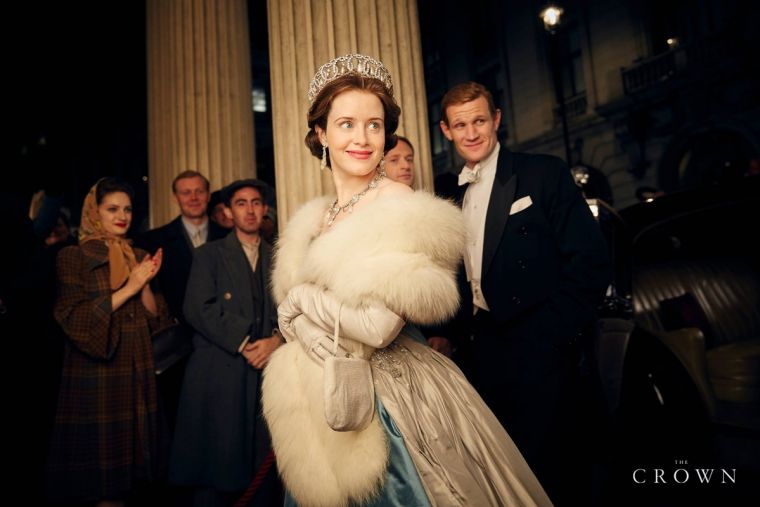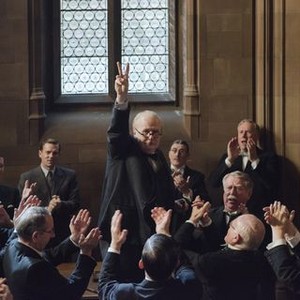'Darkest Hour' and 'The Crown' show a better age: Is the sun setting on Great Britain?
Last week, my colleague Joseph Hartropp wrote beautifully about how the Queen inspires in the age of Donald Trump, on the back of the ongoing Netflix series The Crown.
Having been reluctant – as I must confess to being, though a constitutional monarchist, not the biggest fan of the Windsors – like so many others I've been catching up with the series, and it is so much more than a royal love-in: It is about (so far) 20th century history seen through the prism of the monarchy, the Cabinet and Number Ten.
It is of course not flawless; if I have a criticism it is that the other sphere – ordinary people, or 'average people' as the Queen is fatefully advised to call them at one point – is hardly examined at all when it could have been, in parallel. There is, in turn, a little too much pomp and ceremony for my primitive tastes, and occasional duds when it comes to casting: the wooden portrayal of JFK, though it is his wife Jackie who is the star of the Kennedy episode, being one example.

All this is more than made up for, however, by its fearlessness – the Windsors' Nazi links are explored – and the brilliant performance of Claire Foy as the (blameless) Queen herself.
As she movingly tells her sister Margaret, Elizabeth would have preferred to hide away in the country, focusing on horses; yet she did her duty, having indirectly had it foisted on her by the former King Edward VIII, who emphatically did not. Frequently criticised, personally attacked and, yes, bruised and hurt, the Queen of the 1950s and '60s still comes across as the stoical and, frankly, perfect embodiment of her delicate role (a role of which she has so much more understanding than Prince Charles, of which more another day).
Indeed, by far for me, the most striking scenes are when she is seen praying, alone, kneeling at her bedside; the portrayal of 'a simple Christian'. The Crown does not shy away from her faith being central; and of course it has become more and more so, by her own (real life) account, since those decades.
In her 2016 Christmas address, the Queen said: 'Jesus Christ lived obscurely for most of his life, and never travelled far. He was maligned and rejected by many, though he had done no wrong. And yet, billions of people now follow his teaching and find in him the guiding light for their lives. I am one of them because Christ's example helps me see the value of doing small things with great love, whoever does them and whatever they themselves believe.'
In 2014, she said: 'For me, the life of Jesus Christ, the Prince of Peace, whose birth we celebrate today, is an inspiration and an anchor in my life. A role model of reconciliation and forgiveness, he stretched out his hands in love, acceptance and healing. Christ's example has taught me to seek to respect and value all people, of whatever faith or none.'
This rings true.
That such a woman can remain so popular and the source of so much fascination – there have been reports recently of clicks on her Wikipedia page soaring – hints at something about our thirst for a better age, when Britain wasn't so shapeless and directionless, and had decent values as its anchor.
Which brings us to Darkest Hour, which I also saw over the weekend. Again, the film is far from without flaws: there are scenes that are needlessly embellished, as the writer Simon Jenkins argued in a powerful piece in the Guardian.
I'm so ignorant I thought it conceivable that one potentially moving scene in which Churchill, played characteristically well by Gary Oldman, dips into the Underground to take the temperature of public opinion when it comes to Edward Halifax's grotesque desire to do a deal with the Nazis in 1940 – 'Never! Never! Never!' chant the passengers – could have been true. Alas not (for the best account of Churchill's life, which needs no fiction, see Roy Jenkins's biography).

But take a step back and observe, alongside other recent films like Dunkirk (something of an explosion and special effects fest, I must confess) the popularity of such portrayals of our great figures such as Churchill – surely the only man for the hour – and, yes, the Queen who has seen it all, and you realise that something today is missing.
As we wade through another year of 'Brexit negotiations', turnout at elections continues to fall still lower, and we drift into being a 'post-Christian' country even in the eyes of that giant Anglican leader Rowan Williams, there is surely something big and important lacking in our lives.
A world in which Jeremy Hunt and Boris Johnson, who has a delusional Churchill complex, are 'big beasts' is not the Britain of yesteryear.
Where is the courage, true courage based on the enlightened self interest of the nation and the world, not on the individual? Perhaps such figures will emerge again: after all, the Tories and Labour contain principled and talented figures on their backbenches.
But, with a vacuum on the Commons front benches, with the UK looking increasingly fragile (a whole other discussion: my views here), with the media obsessed with every dispiriting twist and turn of Brexit, and with our collective faith fading, it does indeed appear that the sun is setting on great Britain.











